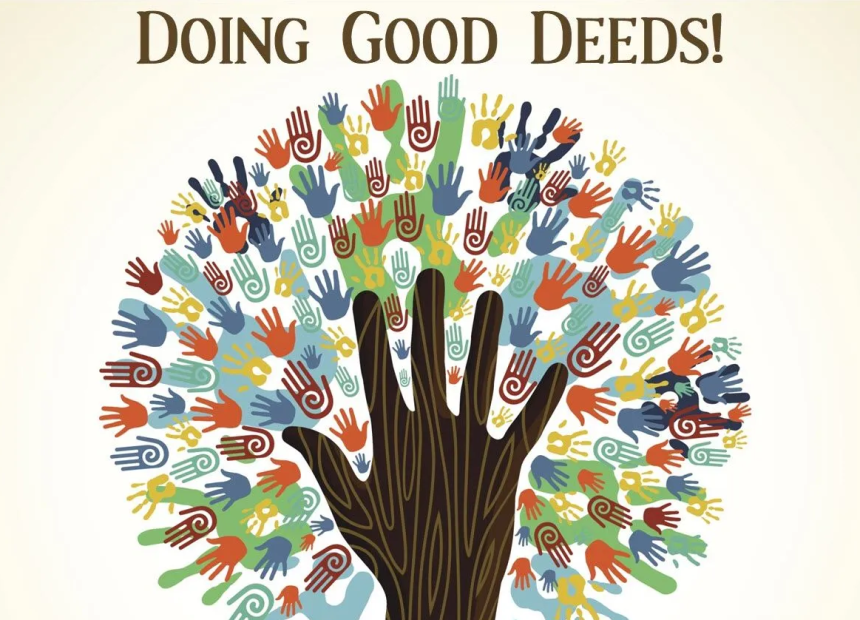In the intricate tapestry of life, our good deeds are the threads of gold that weave a legacy of hope, love, and enduring goodness
In the labyrinth of existence, where shadows often obscure our path and the cacophony of life’s demands drowns out the softer whispers of our conscience, the belief that good deeds are always rewarded stands as a beacon of hope. This notion, as timeless as the human spirit itself, transcends cultures and epochs, threading through the very fabric of our moral and ethical understandings.
At the heart of the concept lies the intrinsic human belief in a moral compass that guides our actions. We are driven not just by instinct and necessity, but by an innate sense of right and wrong. This moral compass, which philosopher Immanuel Kant refers to as the “categorical imperative,” compels us to act out of a sense of duty and for the greater good, rather than from a desire for personal gain.
Kant’s ethical theory suggests that good deeds are performed because they are inherently right, and it is this inherent righteousness that eventually leads to reward. The reward may not always be immediate or even tangible, but it is embedded in the fabric of the cosmos, aligning our fates with the higher order of justice and balance. As Kant famously said, “Two things awe me most, the starry sky above me and the moral law within me.”
The belief in the inevitable reward for good deeds is also eloquently captured in literature, a mirror to our collective consciousness. Charles Dickens, in his timeless classic A Christmas Carol, embodies this in the transformation of Ebenezer Scrooge. Scrooge’s journey from a miserly, selfish man to a benevolent, caring individual illustrates how good deeds can lead to profound personal redemption and societal harmony. His acts of kindness not only reward him with personal happiness and companionship but also ripple out to positively affect those around him.
Similarly, in Les Misérables by Victor Hugo, the character of Jean Valjean represents the triumph of goodness over adversity. Valjean’s numerous acts of kindness, from rescuing a destitute child to sacrificing his own safety for others, illustrate the eternal truth that goodness begets goodness. Hugo’s narrative reassures us that, despite the often harsh and unjust nature of society, good deeds shine through and are ultimately rewarded, whether through the restoration of personal dignity, the loyalty of friends, or the peace that comes from a clear conscience.
Religious texts, too, are replete with assurances of the rewards of good deeds. In the Bhagavad Gita, Lord Krishna advises, “Whatever you do, whatever you eat, whatever you offer in sacrifice, whatever you give away, and whatever austerity you perform, do that as an offering to Me” (9:27). This underscores the belief that selfless actions performed as offerings to the divine are inherently rewarded, aligning one’s life with the cosmic order and bringing spiritual fulfillment.
The Rig Veda also speaks of the rewards of good deeds, emphasizing that righteousness and duty lead to prosperity and peace. The notion of karma, central to Hindu philosophy, holds that every action has consequences, and thus good deeds inevitably lead to positive outcomes, either in this life or in future incarnations.
In the Holy Quran, it is said, “Whoever does righteousness, whether male or female, while he is a believer – We will surely cause him to live a good life, and We will surely give them their reward [in the Hereafter] according to the best of what they used to do” (16:97).
These scriptures reinforce the notion that the universe is governed by a divine justice system where every deed is accounted for, and where ultimate reward or punishment awaits. The very act of performing good deeds is seen as an act of faith, an affirmation of one’s trust in a higher power and the moral order it upholds.
Philosophers have long pondered the nature of good deeds and their rewards. Aristotle, in his Nicomachean Ethics, introduced the concept of eudaimonia, often translated as ‘flourishing’ or ‘the good life’. According to Aristotle, the highest human good is the activity of the soul in accordance with virtue. He argues that true happiness comes from living a life of virtue, where good deeds are their own reward. The pleasure and satisfaction derived from virtuous acts contribute to a fulfilling and flourishing life.
In more modern times, the philosopher John Stuart Mill, a proponent of utilitarianism, posited that actions are right if they promote happiness and wrong if they produce the opposite. Mill’s principle suggests that good deeds, by their very nature of increasing the overall happiness and well-being, contribute to the greater good and thus are inherently rewarding. He encapsulates this thought succinctly: “Actions are right in proportion as they tend to promote happiness; wrong as they tend to produce the reverse of happiness.”
From a psychological perspective, good deeds often trigger a sense of well-being and satisfaction. Acts of kindness release endorphins, the brain’s natural painkillers, leading to what is often referred to as the “helper’s high.” This phenomenon has been studied extensively, revealing that altruistic behavior not only benefits the recipient but also enhances the mental and emotional health of the giver. The simple act of helping others can lead to increased feelings of happiness, reduced stress levels, and even a longer lifespan.
Socially, good deeds foster a sense of community and interconnectedness. When individuals engage in acts of kindness, they contribute to a culture of reciprocity and trust. This social capital, as sociologists term it, is crucial for the functioning of healthy communities and societies. The ripple effect of good deeds can inspire others to act similarly, creating a positive feedback loop that enhances the collective well-being.
The belief that good deeds are always rewarded resonates deeply within the human spirit. It speaks to our fundamental need for justice, our yearning for a moral order, and our hope for a better world. Whether through religious teachings, philosophical reflections, psychological benefits, or social impacts, the rewards of good deeds manifest in myriad ways.
In a world often beset by challenges and uncertainties, this belief offers a guiding light. It encourages us to act with kindness, compassion, and integrity, knowing that our actions, however small, contribute to a greater good. As the poet Henry Wadsworth Longfellow aptly put it, “The talent of success is nothing more than doing what you can do well; and doing well whatever you do, without a thought of fame.”
In contemporary society, the visibility and recognition of good deeds have taken on new dimensions with the advent of social media. Acts of kindness and charity are often broadcast online, garnering likes, shares, and comments. While this can inspire others and spread positivity, it also raises questions about the motivations behind these actions. Are good deeds performed for genuine altruism or for social approval and personal branding?
The public display of good deeds can sometimes blur the lines between selflessness and self-promotion. While the end result—a good deed—remains beneficial, the intention behind it can impact its perceived sincerity. This phenomenon invites us to reflect on our motivations and to strive for a balance where our actions are driven by genuine compassion, even if they happen to be shared publicly.
Ultimately, the rewards of good deeds lie not just in external validation or recognition but in the profound sense of fulfillment and peace that comes from knowing we have made a positive difference. In the intricate tapestry of life, our good deeds are the threads of gold that weave a legacy of hope, love, and enduring goodness.
(Author is a columnist and can be reached at: [email protected])








